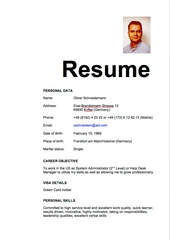My Green Card Story: From Frankfurt to New York
Job Search
Like most people looking for a job, I searched online, reviewed newspaper ads (many jobs were still advertised that way then), and developed leads by networking. Mind that this was before the age of social media. With hindsight, I should have settled on a city to narrow my search! Surprisingly, I was not intimidated by the difficulty of conducting this search from Germany, which made it more difficult to connect with companies and recruiters. Throughout the process, I learned about a few subtle and not so subtle differences between German and American hiring. My experience during countless phone calls with human resources people and recruiters included:
|
Not everyone I spoke to acted like that. Most recruiters and human resources people were professional, even when they couldn't help. Perhaps busy schedules explain why some paid little attention, particularly since the job market was so hot. Of course, there is this cliché, saying that Americans maintain an America-centered perspective. It is said that they may not have much awareness of or interest in foreign cultures, foreigners' backgrounds, foreign countries, and so on. Some of what I experienced can perhaps be explained by a lacking worldly sense. However, many of my contacts sought to understand what I was looking for and did their best to help. The point is: persistence matters.
Once I understood the nuances of the recruiting protocol better, I adjusted my toolkit and routine. Here are a few things to be aware of:
Once I understood the nuances of the recruiting protocol better, I adjusted my toolkit and routine. Here are a few things to be aware of:
- Resumes are much shorter (no more than two pages), it is therefore OK to condense or leave off work experiences that are way in the past
- References are uncommon, it is rare that you will be asked to provide one (also, do not expect to receive a written statement about past job performance when leaving a job)
- Employment contracts are not common, most companies make ‘employment at will’ agreements using a simple offer letter
- Many hiring decisions are made quite fast and rely on the resume, interview(s), and a background check
- The offer letter has to state the offer, a start date, salary/benefits, title, location, manager name, team name (the job description in the job posting outlines responsibilities, which can change)
- A two-week notice period is acceptable when leaving a job to move to a new company
Another myth is that American companies can hire and fire people at will. With a two-week notice period being common, moving from one job from to the next can happen relatively quickly. But this kind of flexibility in the job market goes both ways and doesn't mean that employers can do whatever they want. Terminating someone with cause (meaning the employee failed to perform or broke company policies) requires proof. There are also rules the company needs to follow should it implement a workforce reduction (layoffs).
Back to my search. Since I had no one to guide me, I had to figure out how to approach the search. A few things I did:
It is hard quantify which of the above strategies are more promising than others. Additionally, the way jobs are being advertised and filled has changed in recent years and other considerations for job searchers apply (for example, taking an interim position to convert to full-time employee later on seems more prevalent). What has not changed: networking almost always provides you with the best chances of landing a job.
It took several iterations for my U.S.-styled resume to look presentable. The main differences include:
Back to my search. Since I had no one to guide me, I had to figure out how to approach the search. A few things I did:
- Designed an English resume (translation, layout, structure)
- Looked up resumes online to understand the style and reflect the typical layout on my resume
- Published an English website with my resume
- Listed my website in various search engines
- Submitted my resume to U.S. job boards
- Searched and applied for open positions I found on job boards
- Browsed online versions of U.S. newspapers for open positions
- Browsed German newspaper ads for potential leads to jobs in the U.S.
- Contacted recruiting agencies in Germany and in the U.S.
- Sent a Word document with my resume to contacts I had made
- Provided friends with acquaintances or family in the U.S. with my resume, to have it forwarded
- Signed up for a call-back/calling card provider to make cheap calls to the U.S. (this is easier today due to the prevalence of VoIP services and video conferencing)
It is hard quantify which of the above strategies are more promising than others. Additionally, the way jobs are being advertised and filled has changed in recent years and other considerations for job searchers apply (for example, taking an interim position to convert to full-time employee later on seems more prevalent). What has not changed: networking almost always provides you with the best chances of landing a job.
It took several iterations for my U.S.-styled resume to look presentable. The main differences include:
|
Most recruiters and hiring managers are so busy that they spend very little time reviewing resumes. They may make up their mind in a split-second. To combat this issue, the resume needs to be succinct and (at the same time) written in a way that catches attention. It is key to advertise how you stand out from the crowd. If on first look it is hard to find relevant experience on a resume, it is usually discarded. That makes it important to decide not only what information to include and how to emphasize it, but also what to leave out.
Accomplishments are the most important content on the resume. They need to be written so that they emphasize measurable achievements that benefitted the organization. Avoid at all costs to only list responsibilities, this will will result in a bland listing of activities and won't make you to stand out from the crowd. Describing what the job was is necessary, and providing a little context about the company also makes sense. The real story, however, is about the results you produced. Highlight project or work results in an outcome-focused manner, using quantitative indicators. For example, you "saved $x" or "generated $y new revenue" or "reduced transaction time from n2 to n1". If you cannot provide a money-focused quantitative indicator (i.e. revenue or savings) because of the job's structure, find another way to express scale, magnitude, and impact using numbers.
It is common to customize the resume to match the job you are applying for. Essentially, you would ensure that the most important key words used in the job description appear in the resume. The recruiter or hiring manager will then be able to understand whether your background is a match. Other things to consider:
Accomplishments are the most important content on the resume. They need to be written so that they emphasize measurable achievements that benefitted the organization. Avoid at all costs to only list responsibilities, this will will result in a bland listing of activities and won't make you to stand out from the crowd. Describing what the job was is necessary, and providing a little context about the company also makes sense. The real story, however, is about the results you produced. Highlight project or work results in an outcome-focused manner, using quantitative indicators. For example, you "saved $x" or "generated $y new revenue" or "reduced transaction time from n2 to n1". If you cannot provide a money-focused quantitative indicator (i.e. revenue or savings) because of the job's structure, find another way to express scale, magnitude, and impact using numbers.
It is common to customize the resume to match the job you are applying for. Essentially, you would ensure that the most important key words used in the job description appear in the resume. The recruiter or hiring manager will then be able to understand whether your background is a match. Other things to consider:
Maintaining a social media presence was not a great concern for me in 1998, but times have changed and you need to have relevant profiles on online networking platforms. Always assume that the hiring process for most positions is competitive and that other candidates will be considered (even when a personal contact led to an interview). It therefore is important to find a way to explain in your resume how your experience will allow the company to solve the problem it presumably has (otherwise they wouldn’t be hiring). Lastly, be appropriately assertive, follow up multiple times once you applied, and never assume the company knows that you want the job. Say it.
I followed up three times with a contact before I stopped pursuing the lead. Since I had not narrowed my search to a city, I targeted specific companies that interested me (mostly large international firms) and distributed my resume widely. My goal was to get a job anywhere but related to my background - just to get started. Within three months, I had established promising contacts in New York, Boston, Sarasota, and Irvine. While visiting these cities in March 1998, I also checked online for local recruiting firms and scheduled additional ad-hoc interviews.
I followed up three times with a contact before I stopped pursuing the lead. Since I had not narrowed my search to a city, I targeted specific companies that interested me (mostly large international firms) and distributed my resume widely. My goal was to get a job anywhere but related to my background - just to get started. Within three months, I had established promising contacts in New York, Boston, Sarasota, and Irvine. While visiting these cities in March 1998, I also checked online for local recruiting firms and scheduled additional ad-hoc interviews.
|
There are nuances to be aware of when interviewing in the U.S.. Questions directed to the candidate always must be about the candidate's qualifications for the job. It is not permissible for a recruiter or hiring manager to ask personal questions (about family, age, hobbies, interests, etc.). Should a personal question have been asked during an interview but the applicant did not get the job, they might sue the company.
|
The applicant, in such a scenario, might claim discrimination or preferential treatment of another candidate. If it get's to that point, the candidate’s lawyer would argue that the company asked about an issue unrelated to the job and then disqualified the candidate based on this unrelated issue (whether this was the case or not). Courts often favor that viewpoint. Hiring managers therefore may come across as timid during interviews since a slight misstep on their end can have consequences. A spurned candidate might not even sue the company to get hired. Rather, they will want money. The U.S. generally is a quite litigation-happy society.
Even if it never crossed your mind how you might get treated in an interview, or if you are of the opinion that it would never occur to you to sue a company you want to work for, only provide minimal personal information when it is relevant to the discussion and the job. Use good judgment.
Even if it never crossed your mind how you might get treated in an interview, or if you are of the opinion that it would never occur to you to sue a company you want to work for, only provide minimal personal information when it is relevant to the discussion and the job. Use good judgment.
|
There exist other sensitive areas in employee relations (confidentiality, non-competes, harassment, discrimination, etc.) that I cannot cover here. Once started in a new job, read the employee handbook, understand the policies, keep your eyes open, and learn fast. As is almost always the case, common sense is usually a good guide. All this is part of your cultural transformation and needs to be treated with attention and care.
|
* * *
With a job and accommodations secured, I had established the foundation to get organized in my new home, New York City. Although, there was still a lot to do, to really get started.





